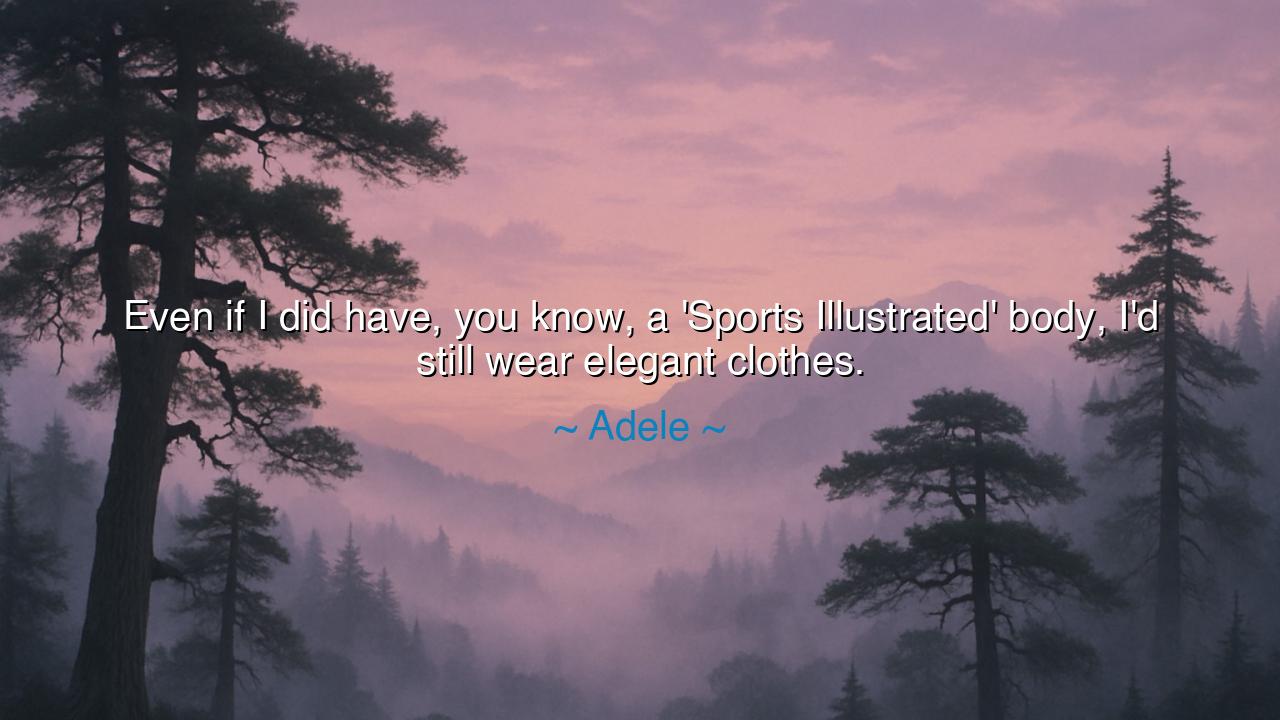
Even if I did have, you know, a 'Sports Illustrated' body, I'd
Even if I did have, you know, a 'Sports Illustrated' body, I'd still wear elegant clothes.






Listen, O seekers of wisdom, and attend the words of Adele, whose voice carries both elegance and defiance: “Even if I did have, you know, a 'Sports Illustrated' body, I'd still wear elegant clothes.” In this declaration lies a profound truth: that beauty, worth, and expression are not bound to the measure of flesh or the fleeting standards of the world. Elegance is a choice, a declaration of self-respect, and a manifestation of inner strength, independent of the form one inhabits.
The origin of this insight comes not merely from fashion, but from lived experience. Adele, a woman whose voice has moved millions, understands the pressures placed upon individuals—especially women—by a society that equates value with physical perfection. Yet she proclaims a higher truth: identity and self-expression are sovereign. Even if one possessed the body celebrated in magazines or admired on runways, the essence of a person—their choices, their dignity, their elegance—remains unchained from outward expectation.
Consider the life of Coco Chanel, who revolutionized fashion not by conforming to the ideals of her time, but by redefining elegance itself. Born into modest circumstances, Chanel chose simplicity and sophistication over the constraints of societal expectation. She taught that clothing is an extension of character, not merely a reflection of body type. Adele’s words echo this wisdom: elegance is an act of the spirit, an assertion that one’s value is intrinsic, not dictated by the ephemeral gaze of the world.
In a society obsessed with physical ideals, it is tempting to equate beauty with conformity. Yet history is rich with examples of those who transcended these narrow measures. The singer Ella Fitzgerald, whose body did not fit the conventional molds of glamour, commanded the stage with style, poise, and an aura far surpassing any superficial standard. Her elegance, much like Adele’s, radiated from her confidence, talent, and authenticity, proving that true grace is independent of form.
Adele’s statement also carries the subtle reminder that choice is freedom. The world may prescribe what is fashionable, desirable, or admirable, yet each soul possesses the agency to define their own expression. To wear elegant clothes, to cultivate dignity, to honor oneself in appearance and conduct, is to claim authority over one’s own life. Elegance, then, is not a gift of genetics but a practice of intentionality, a daily assertion of self-respect and artistry.
The ancients understood this principle. Roman matrons, for instance, adorned themselves not only to please the eye but to convey virtue, poise, and social presence. Their garments spoke of character and standing, of discipline and taste, not merely the symmetry of body. Similarly, Adele reminds us that elegance is a declaration, a conscious choice to project the fullness of one’s self, independent of societal pressures or physical ideals.
From this, a lesson emerges for every soul: do not tether your sense of worth to external measures. Cultivate elegance in thought, in demeanor, and in presentation. Let your choices reflect your spirit, your values, and your inner strength, not the transient standards of the moment. Beauty and sophistication flow from self-respect, authenticity, and the courage to be yourself.
Therefore, in your own life, act with deliberate grace. Wear what honors your essence, speak with dignity, move with confidence. Understand that elegance is eternal, unbound by the changing tides of fashion, body ideals, or external judgment. In this, you embody the wisdom of Adele: that true refinement is an inner flame, one that shines brighter than any outward standard, and it is within your power to nurture it every day.






AAdministratorAdministrator
Welcome, honored guests. Please leave a comment, we will respond soon